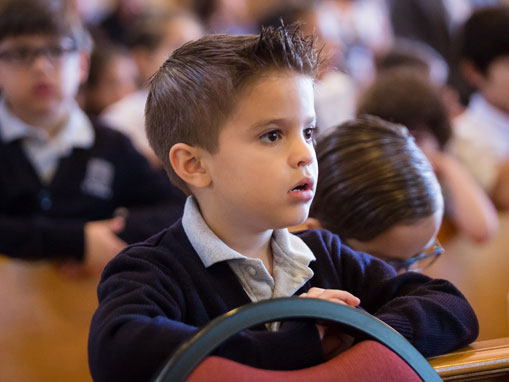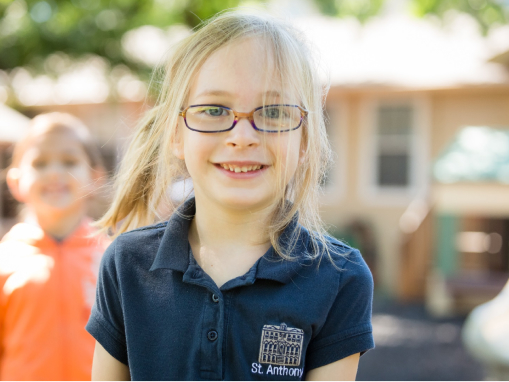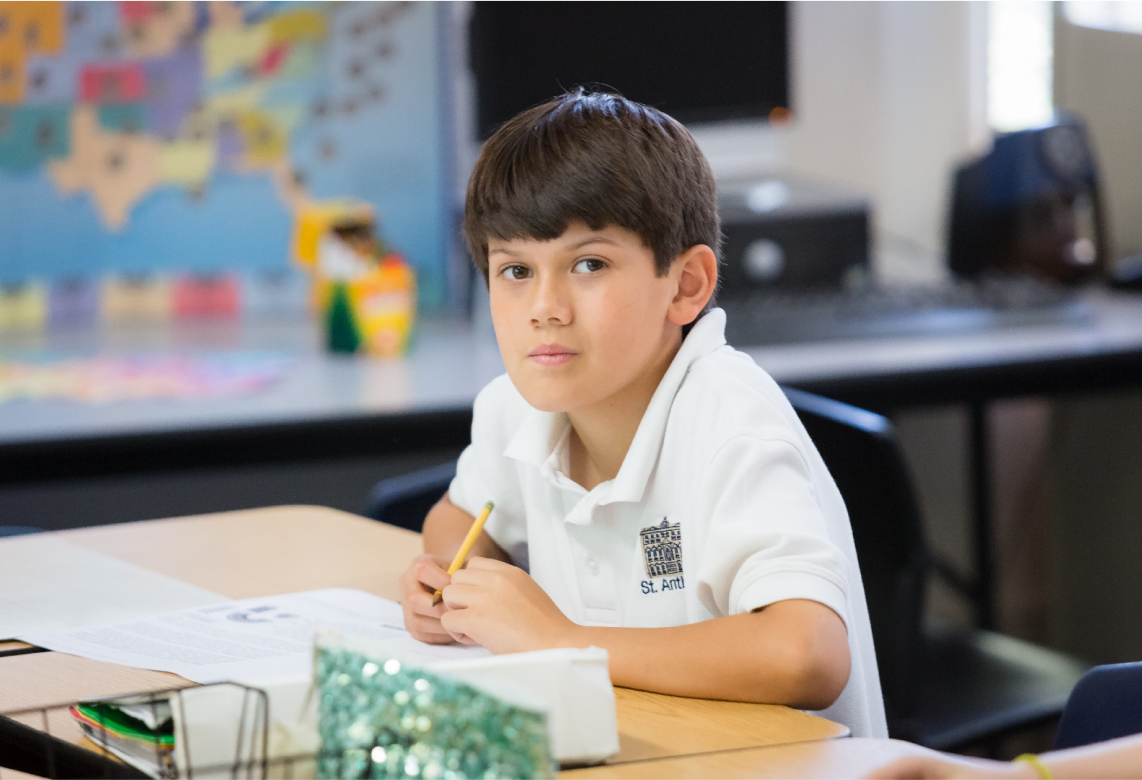
Building a foundation of faith and learning begins in a child’s formative years. At St. Anthony, we offer our Katherine Ryan Early Childhood Program (KRP) which is designed to give your two-, three-, four-, and five-year old a full day of fundamental learning. Our program is focused on giving our youngest students the building blocks to meet their full potential in all aspects of their life, from their spiritual center to their cognitive growth.
We are pleased to offer LISTA- Language Immersion at St. Anthony’s at the PK3 – K5 level, with expansion into the elementary years. Students acquire a second language through a combination of natural acquisition and direct teaching. Click Here to find out more about LISTA.
Pre-school children are inquisitive and open vessels for learning and growth. The KRP at St. Anthony offers a well-rounded curriculum and activities to stimulate young minds and nurture their curious and creative nature. Founded in faith, our degreed, certified teachers and experienced teacher assistants create fun and interactive days for our preschool students to learn, both on an academic and personal level
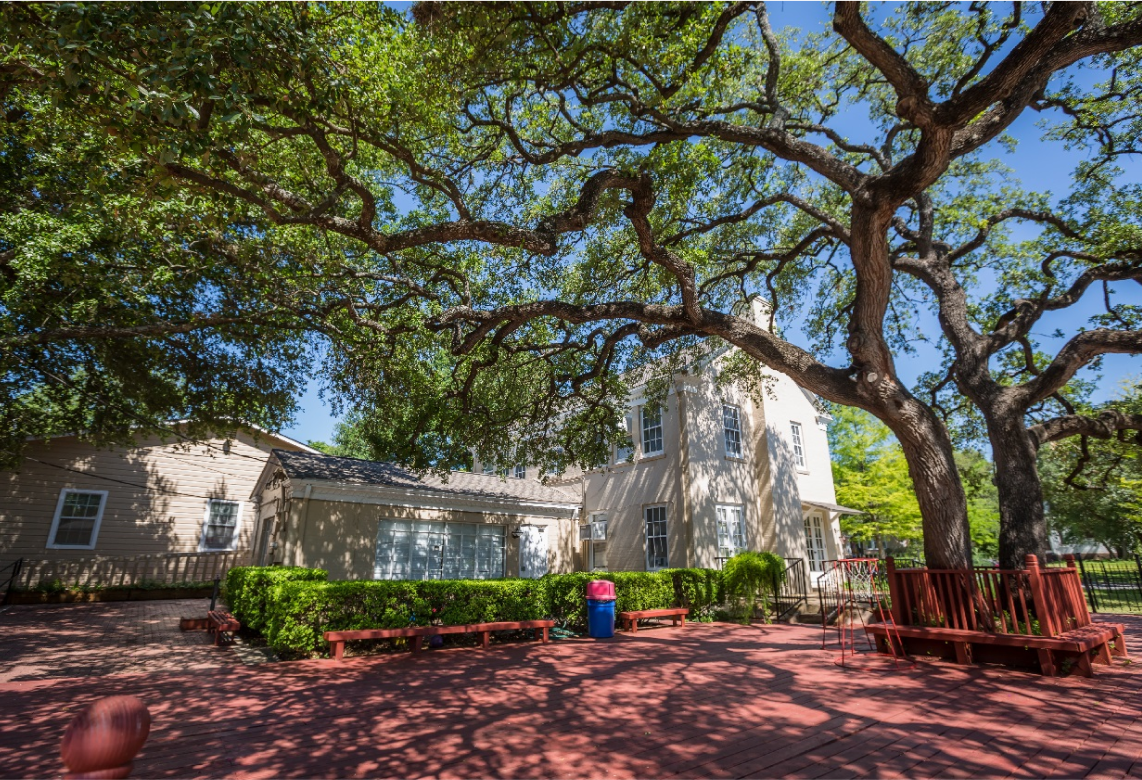
Our approach to early childhood education combines the total needs of each child to give them a well-balanced education. Our early childhood educators create daily itineraries that include core academic and enrichment classes, physical play, nutritious meals, faith-based activities and periods of rest. This approach to fostering well-rounded schedules gives our young students exposure to the stimuli they need to meet their highest potential, academically, creatively and spiritually, all in a healthy, safe environment.
Learning takes place through whole-language, literature-based, and discovery-oriented processes in which children are given the opportunity to experience the fun in learning. Positive guidance methods and successful experiences encourage strong self-confidence and emotional health.
The Katherine Ryan Program academic day runs from 7:40 a.m. to 2:45 p.m.
Give your child a strong foundation of learning, creativity and faith at St. Anthony’s Katherine Ryan Early Childhood Program. Call today to schedule your campus tour and learn more about the KRP and our other educational options for elementary and middle school age children.
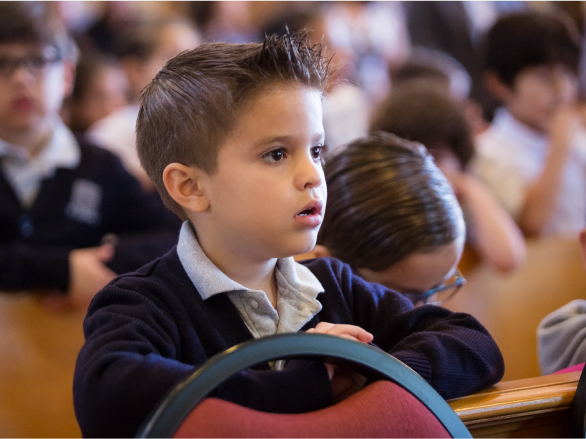
Pre-K3 is designed to develop reading readiness, cognitive development, physical development, social/emotional behavior and religious growth. The program encourages students to develop a strong, positive self-outlook and recognize themselves not only as individuals, but as members of a school community. Students are encouraged to explore, engage and create in a variety of settings including whole group, small group and one-to-one instruction with the teacher and an instructional assistant. The daily schedule allows time for creative play, independent explorations, self-study, and rest. As the year progresses, children will develop and begin to see themselves as competent learners.
A balanced schedule of activities, rest, and nutritious meals and snacks are provided for the physical well-being of the children. Spiritual growth is fostered through religious observances, Mass, prayer services, and daily activities.
Spanish immersion is introduced at a minimum of 50% of the academic day. The Spanish language is supported with English to ensure understanding and full acquisition.
Students are exposed to a variety of print rich materials and have hands-on practice with free writing through the use of journals, centers, and manipulatives. Students will develop oral communication and listening skills by continuously sharing ideas, experiences, and responding to stories during daily story time. The students will also increase their vocabulary by identifying objects, names, and also are introduced to letters and letter sounds.
The mathematics program is hands on, interactive, and explorative. Students learn mathematical concepts by using a variety of manipulatives, art work, and games. The students count daily, review months of the year, days of the week, and patterns through our daily calendar time. The students will also develop awareness of basic shapes, colors, recognition of numbers 0-10, and one-to-one correspondence through song and play.
The students are engaged, challenged, and encouraged daily in developing gross motor and fine motor skills. Students participate twice weekly in Physical Education. The students are also taught through music in motion, playground time and other various activities to increase their gross motor development. The students also gradually develop fine motor coordination through pre-writing, center play, and art creations/activities.
Throughout the year, the students will develop a positive self image. Students will be introduced to instructional and listening skills during the daily morning circle time. The teachers and instructional assistants will constantly model proper behavior to teach and show children self-awareness and responsibility for all actions in any situation. Students will have other opportunities to display and develop self-help skills, self-control, and consideration for others throughout their day.
The students begin to understand their role as a member of Christ’s family by participating in daily prayer and a weekly prayer service. Students become aware of God’s life and gifts received by His grace during daily religion time. The religion course follows the Archdiocesan standards using the God Made Everything curriculum. Each day begins with an opening prayer and closes with a final prayer.
The academic week is completed with engaging classes that include Music, Physical Education, Art, Library, and Technology. The students engage daily in a craft or free art project that corresponds to the theme of the month. Several field trips and in-school programs are provided throughout the school year to enhance the curriculum. Weekly dance classes are also offered after school for registered students.
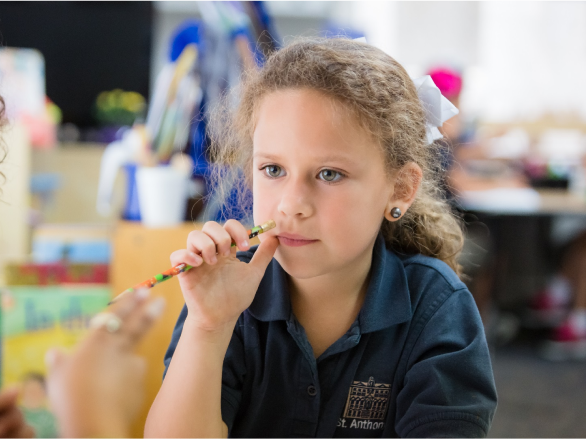
Spanish is the language of instruction for 70% of the academic day. The Spanish language is supported with English to ensure understanding. Emphasis is placed on pre-reading skills, letter and sound recognition and mathematics concepts, all in Spanish. Parents support English reading at home through read-alouds and basic homework help. Spanish is also the language of instruction for science and social studies.
The Pre-K4 program at St. Anthony Catholic School is a journey to discovery that provides students with opportunities to make connections and gain academic skills in a nurturing, faith-based environment. Students are able to grow and develop Christian values that emphasize our loving faith, respect, and consideration of others. Students take part in active lessons that explore academics and allow them to practice their skills through whole group, small group, and individual instruction. Students are able to explore centers, cultivate peer relationships, and develop responsibility. Socialization is key in the learning process and is integrated in all areas to foster a positive self-concept, encourage social and emotional development and problem-solving skills. In addition, the students are enriched through Music, Art, STEM and Physical Education.
Students develop early reading, writing, and verbal skills while being exposed to literature through stories, fairy tales, and finger plays. Students will develop a love of reading as they explore book and print concepts during story time, story retelling, and engaging language activities. Pre-writing skills and story creating will be emphasized through free writing and journaling. This allows students to enhance their vocabulary as they dictate sentences and stories to accompany their drawings. Proper letter formation and beginning writing skills are fostered during small group instruction. Rhyming skills, letter knowledge, and letter sounds are worked on throughout the school year to provide a sound foundation for the development of reading in Kindergarten. Students will be provided with opportunities to develop listening skills, increase time on task, and follow directions on a daily basis.
Students develop many math skills during Pre-K4 that include counting, sorting, classification, patterning, one-to-one correspondence, sequencing, and graphing. A variety of concrete objects and manipulatives help them develop and understand concepts needed to solve simple problems on a daily basis. Students will engage in songs, finger plays, and hands-on activities as well as calendar activities. Other concepts taught include recognition of basic colors and shapes, numbers up to 30, following directions as well as quantity and positional words. Students are also introduced to math terms such as equal, less, more, addition, and subtraction.
Science is an exciting part of the Pre-K4 program as the students explore and investigate a number of weather, environmental, and animal themes throughout the year. Students are able to observe, predict, and examine the world around them by using their senses, which promotes questions and exploration of their surroundings. They are able to explore using regular classroom items, such as magnifying glasses, magnets, measurement tools, or easily accessible materials found in nature. Experiments are integrated into weekly instruction, and the students begin to understand concepts such as conservation, preservation, and natural resources.
Students experience a sense of belonging to a community, learn respect and care for themselves as well as others. Social skills are an integral part of the Pre-K4 curriculum where students learn how to interact with others in the classroom setting, while developing skills in problem solving, conflict resolution, and sharing. Students will learn skills to help them relate to his or her world through positive interactions with their peers as well as adults. Students will gain independence as they develop self-help skills on basic personal needs. They will learn about the importance of community helpers and explore family and extended community concepts.
Art is an essential part of the K4 program as it promotes fine motor skills, creativity, and a sense of accomplishment in all the students. It provides opportunities for self-expression and is incorporated into all thematic units along with free choice art activities. A variety of media tools such as paint, watercolors, crayons, markers, colored pencils, and dot art are available for the students to use.
Students learn of God’s love and the gifts He gives, and begin to form Christian values of love, kindness, and helping others. They discover and grow in their relationship with God through activities that emphasize the importance of prayer, Bible stories, the Holy Family, and saints. Students will understand that God created us and the world we live in. Through prayer, participation at weekly prayer service, Bible stories, and songs the students will begin to shape their Catholic identity.
The academic week is completed with engaging classes that include Music, Physical Education, Library, and Technology. Several field trips and in-school programs are provided throughout the school year to enhance the curriculum. Weekly dance classes are also offered after school for registered students.
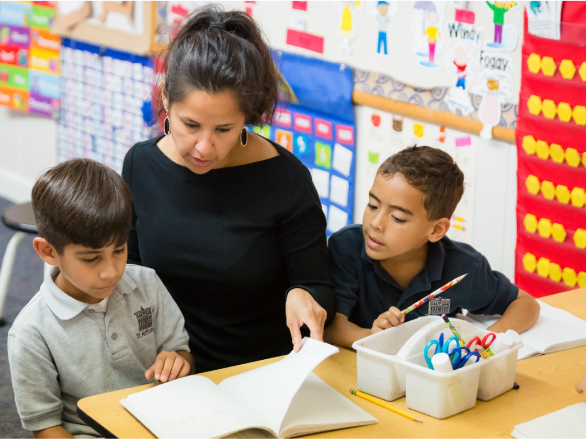
Spanish is the language of instruction for 80% of the academic day. The Spanish language is supported with English to ensure understanding. Emphasis is placed on reading readiness, writing and mathematics concepts, all in Spanish. Parents support English reading at home through read-alouds and basic homework help. Spanish is also the language of instruction for science and social studies.
The Kindergarten program is designed to develop cognitive, social, emotional, and physical growth. It assists children in developing strong positive feelings about themselves as individuals and as members of a school community. Students learn in a nurturing environment where they are encouraged to be curious and creative. Students work in a variety of settings including whole group, small group, and one-to-one instruction with the teacher and an instructional assistant. Time is scheduled for independent exploration and study. Children begin to see themselves as competent learners as they progress through the year.
In reading and writing, a reasonable goal for kindergarten is to have all students beginning to read and write on their own by the end of the kindergarten year. The goal is met through a Balanced Literacy approach to include.
Students use a combination of drawing, dictating, and writing to compose narratives. As the year progresses and their writing skills develop, their own narratives will consist of one or two sentences. The emphasis is on telling the story and getting their thoughts on paper.
The Zaner-Bloser handwriting book is used to encourage correct letter formation of uppercase and lowercase letters. Students are shown how to hold a pencil correctly, use scissors correctly, explore letter formation using color, paint and glue, and print their first and last name.
Students continue to develop their math skills through daily math instruction. The skills introduced in kindergarten using enVision Math and a hands-on approach include the following:
Using a variety of materials, students further develop beginning science skills of observing, sorting, predicting, comparing, and classifying. The children are exposed to hands-on activities dealing with earth, physical, and life sciences. The following focus areas are covered
Children learn how to relate to each other as family members of a school community and citizens of their local community. They learn to work and play together and to respect their individual differences. The relationships that children build at school and their community are taught through the following concepts:
Students develop a sense of prayer and worship by celebrating Mass on a weekly basis. Daily religion class is taught following the Archdiocesan standards and the God Loves Us series by Loyola Press. Daily prayers include Morning Prayer, Grace before Meals, and dismissal prayer. Students are taught an awareness of Catholic identity both in and out of the classroom setting. This is accomplished through the students understanding of:
The goal is to develop an appreciation of art and artistic terms and techniques while encouraging children to express their creativity and individuality. For the kindergartner, art will take the form of drawing, painting, cutting and pasting, and working with other materials.
The academic week is completed with engaging classes that include Music, Physical Education, Library, and Technology. Several field trips and in-school programs are provided throughout the school year to enhance the curriculum. Weekly dance classes are also offered after school for registered students.
